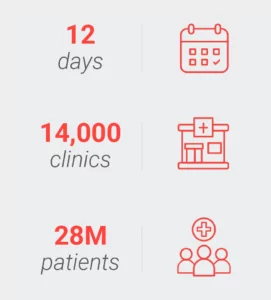CHALLENGE
The Health Resources and Services Administration (HRSA) plays a crucial role as an agency within the Department of Health and Human Services (HHS) by working toward its core objective of improving health care access. HRSA’s efforts include improving access to health care for marginalized communities, including individuals living in rural areas, low-income families, and those without health insurance.

When Congress passed the Coronavirus Preparedness and Response Supplemental Appropriations Act on March 6, 2020, HRSA was given the job of launching and administering grants to help health centers with emergency planning and response. HRSA started issuing grants just 18 days after receiving the mandate. This was a top priority for both HRSA and REI Systems, who has long been a trusted partner to the agency.
Together, we modified forms and configured REI’s Electronic Handbook (EHB) grant management software designed explicitly for HRSA. We collaborated closely to streamline processes and train HRSA’s staff to ensure prompt delivery of funds to frontline health care providers.
When Congress passed the CARES Act on March 27, HRSA worked even harder and managed to disburse funds to local health centers for COVID testing, diagnosing, and treatment by April 8, only 12 days later. One of HRSA’s major obstacles was that Congress was moving funds quickly to help fight COVID-19. This meant HRSA had to act fast to help health clinics in need. However, every state and clinic had unique needs, and it was important to make sure the funds were spent properly. The stakeholders were concerned that rushing the process might lead to waste, fraud, abuse, non-compliance, and poor accountability.
SOLUTION

Thanks to the ongoing partnership, HRSA successfully manage the challenges of distributing federal funds to health clinics during the pandemic. Our combined knowledge of grants management and technology made the process smoother and helped meet each state and clinic’s specific needs.
The combination of tools, processes, approaches, and technology we implemented at HRSA allowed them to respond swiftly to a national emergency:
Agile Delivery Framework (ADF): ADF allows for the fast delivery of programs, communication, and technology when circumstances change. The Agile approach adopted by both organizations was crucial in reducing risks such as waste, fraud, abuse, non-compliance, and poor oversight, while also meeting the urgent needs of health care providers nationwide.
Microservices and Containers: Microservices break down big, complex systems into smaller, separate parts, such as app modules or reporting modules. This makes it simpler to change one part if a new law is passed, like the CARES Act. Containers hold these modules and can be easily copied and started, either on an agency’s computers or in the cloud. Our emphasis on mission and modular tools enables us to assist HRSA in adapting its grant-making process more quickly than any other federal agency.
Batch Processing: The awards process requires significant data input for each award (about 100 fields of data), and over 90% of the data is the same for all awards. The batching interface helps the HRSA apply the common information in one action. Think of an Excel drag and fill instead of typing the same info in each cell. Batch processing in the data aggregation stage of the awards process greatly cuts down time, from weeks to less than a day per funding opportunity.
User-Centered Design: HRSA knows its customers, which are health centers and their beneficiaries — vulnerable Americans struggling to access health care. By involving users in the design process and gathering feedback after they tried the solution, REI and HRSA helped clinics and providers focus more on health care and less on grants and reporting. Intuitive design eliminated the need for elaborate training and hence allowing the HRSA staff to hit the ground running.
Behavior-Driven Development (BDD): REI recognizes that real people at HRSA use our solutions daily. By getting their input and monitoring their behavior while using EHBs, REI can make improvements – such as introducing chatbots to minimize the need to navigate through menus. BDD helped in faster development cycles with a reduced chance of errors. It also helped automate test cases as opposed to doing manual testing.
New compliance methods, data, and technology: REI instituted various gate checks and environment transitions to reduce errors and defects. These processes helped HRSA minimize risk while rapidly implementing a significant new funding program.
DevSecOps, Automation, and CI/CD: To innovate quickly, we need to test a solution, fix issues, and build on what works. Automation and CI/CD (Continuous Integration/Continuous Deployment) allow us to test a new solution 10 times a day, rather than just once every 10 days. REI was able to collaborate in a multi-vendor environment with the “ops” and “sec” teams.
Flexible Application Architecture: Unlike a typical grants process, which must go through the entire cycle of Application, Review, and Awards, our system is designed to bypass specific steps and make the awards when needed. This flexibility played a crucial role in distributing the COVID awards at a record-breaking speed.
Strong Post-Award Management: As HRSA rushed to provide funds to health centers during the pandemic, it still required data from grantees to evaluate the impact and identify gaps. The EHB’s robust post-award management process, featuring multiple modules like Progress Reports and Prior Approvals, was used to assign tasks for grantees to report on progress, successes, and challenges.
IMPACT
REI played a vital role in helping HRSA achieve a groundbreaking milestone: becoming the first government agency to rapidly funnel funds to the frontline health care providers in the fight against COVID-19. This speedy response sent resources to the right place and maintained high levels of compliance.

Working together, HRSA and REI developed new tools, processes, and technologies that made it easier for grant recipients to follow the rules and reduced risks. This helped all grants pass audits and demonstrated how well the two organizations worked together.
LESSONS LEARNED

Be selective with new technology – use data to make smart choices. As IT constantly changes, agencies need to carefully decide where to invest, based on data about expected returns. HRSA used Technology Business Management (TBM) data to measure the value of current and potential IT investments and compare itself to other agencies and private businesses. This helped HRSA choose the best technologies to adopt and avoid.
When data access is too restrictive, it goes unused and loses value. Before modernization, HRSA’s data was hardly used because of limited access. With REI’s Modern Data Analytics Platform (MDAP), almost any program staff member can now access and analyze data using Tableau. As a result, over 250 program staff members use data to identify successes, diagnose challenges, and improve health care outcomes.
Complex systems must communicate effectively with everyone. HRSA grant managers, health program staff, and applicants are the main users of the EHB system. But when REI tailored some system outputs for Congress and political executives at HHS, HRSA was able to inform and gain key stakeholders’ confidence.
There may be no direct link, but HRSA consequently found success in seeking funds for its health center program through COVID legislation. In preparation for unexpected events, HRSA asked REI to modernize its EHB grant solution, which enabled fast adaptation to new programs using modern architecture and analytic tools. Moreover, REI’s Mindful Modernization™ of HRSA’s EHBs enabled the following:
Rapid launch of a new grant program in just 12 days after the CARES Act passed, distributing funds to health care providers quickly for COVID testing, diagnosis, and treatment.
- Distribution of funds to where they were most needed, reaching 14,000 health clinics and over 28 million patients through secure authentication of recipients.
- Self-service functionality for end users, reducing operating costs by over 30% and reducing grantee burden by 25% through mobile technology.
- Real-time data and analytics to identify top-performing grantees in saving premature babies.
- Continuous Integration/Continuous Delivery to automate IT system updates, cutting costs and effort by 60% while allowing for faster innovation in improving Americans’ health.
- Streamlined grant processes and compliance with regulations, resulting in no identified waste, fraud, or abuse and no material issues during an audit of HRSA’s COVID grants.
- Improved outcomes for patients at HRSA-funded clinics, with AIDS patients receiving care funded by HRSA achieving virus suppression (87%) more often than all Americans with AIDS (63%).
In summary, the partnership between REI and HRSA played a critical role in getting funds fast to frontline health care providers during the COVID-19 pandemic. The foundation REI had laid at HRSA empowered the agency to quickly adapt to the crisis and provide emergency funding to health centers. Moreover, the use of emerging technologies and modern tools and approaches helped streamline processes and ease the burden on grant recipients. The lessons from this partnership will continue to guide HRSA in effectively addressing the nation’s health care needs.



 Rapid launch of a new grant program in just 12 days after the CARES Act passed, distributing funds to health care providers quickly for COVID testing, diagnosis, and treatment.
Rapid launch of a new grant program in just 12 days after the CARES Act passed, distributing funds to health care providers quickly for COVID testing, diagnosis, and treatment.

